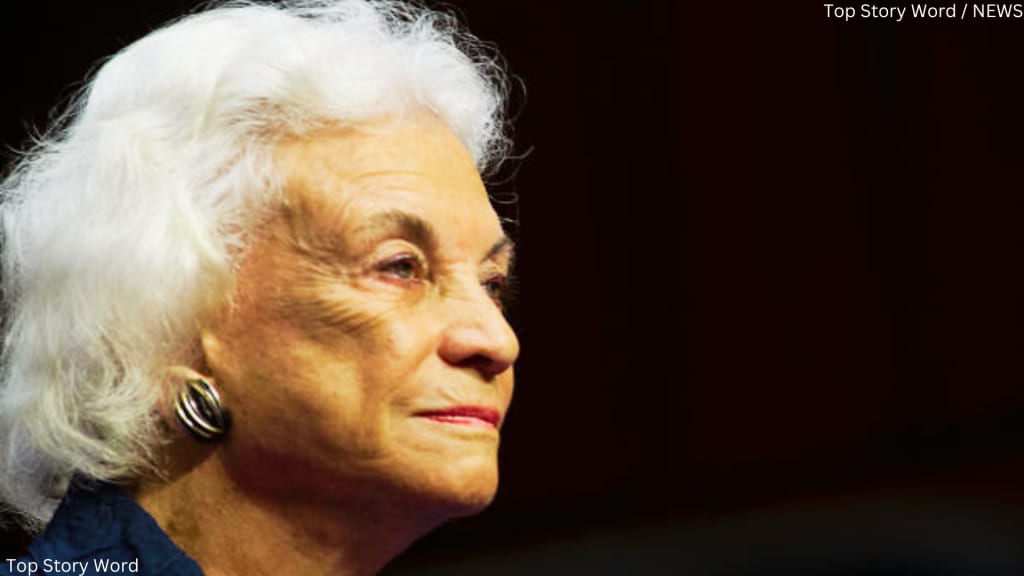Sandra Day O'Connor,Dies at 93 First Woman On The Supreme Court,
Sandra Day O'Connor,Dies at 93

Washington – Retired Justice Sandra Day O'Connor, who made history as the first woman to serve on the Supreme Court, passed away at the age of 93. The Court announced that O'Connor died on Friday in Phoenix, Arizona, following complications related to dementia and a respiratory illness.
O'Connor, who retired from public life in 2018 after being diagnosed with dementia, was appointed to the Supreme Court by President Ronald Reagan in 1981. During her 24-year tenure on the bench, she became known for her undaunted determination, indisputable ability, and engaging candor.
Born in El Paso, Texas in 1930, O'Connor grew up on her family's cattle ranch in southeastern Arizona. She graduated from Stanford Law School in 1952, where she finished her degree two years earlier than usual and ranked third in her class. After struggling to find employment due to her gender, O'Connor began a private practice in Arizona with another lawyer. She later served as a deputy county attorney and as an assistant state attorney general before being elected to the Arizona State Senate in 1966. In 1974, O'Connor was elected to the Maricopa County Superior Court and was appointed to the Arizona Court of Appeals four years later.
O'Connor's appointment to the Supreme Court by President Reagan in 1981 marked a historic moment for women in law and politics. She was confirmed overwhelmingly by the Senate with a unanimous vote of 99-0. During her time on the bench, O'Connor became known for her swing vote in divisive cases, including those involving abortion and affirmative action. She also played a crucial role in the landmark decisions Planned Parenthood v. Casey and Grutter v. Bollinger.
In Planned Parenthood v. Casey (1992), O'Connor delivered a joint opinion with Justices Anthony Kennedy and David Souter that reaffirmed Roe v. Wade (1973), which legalized abortion. In Grutter v. Bollinger (2003), O'Connor wrote the majority opinion that allowed for the narrowly tailored use of race in admissions decisions at universities and colleges. However, in June of this year, the Supreme Court brought an end to race-conscious admissions programs at colleges and universities, finding that they cannot be reconciled with the Constitution's equal protection guarantees.
Chief Justice John Roberts paid tribute to O'Connor, describing her as "our Nation's first female Justice" and praising her "engaging candor" and "indisputable ability." He added that "we mourn the loss of a beloved colleague" and celebrate her "enduring legacy as a true public servant and patriot."
O'Connor was more than just a trailblazing legal figure; she was also an inspiration to women everywhere who faced barriers due to their gender. As she entered the legal field in the 1950s, O'Connor struggled to find employment because of her gender and received only one offer to work as a legal secretary at a firm based in Los Angeles. She turned down the job and offered to work for free for the county attorney for San Mateo County in California. She then was hired as deputy county attorney and, after her husband was stationed in Frankfurt, Germany during his military service, worked as a civilian attorney with the Army Quartermaster Corps.
O'Connor entered judicial branch in 1974 when she was elected to the Maricopa County Superior Court. She served as a judge on the county court from 1975 to 1979 when she was appointed to the Arizona Court of Appeals by Governor Bruce Babbitt (D). During this time period, O’Connor became known for her independence and intellectual rigor on issues ranging from criminal justice reform to civil rights protections for women and minorities. Her reputation as an outstanding jurist caught President Reagan’s attention when he was searching for someone to fill a vacancy on the Supreme Court left by retiring Justice Potter Stewart (R). Reagan followed through on his campaign promise that he would appoint a woman justice if elected president by selecting O’Connor for this historic role.
O’Connor’s confirmation process was not without controversy; some critics argued that she lacked sufficient experience at both federal trial court level or federal appellate court level before being appointed directly to the Supreme Court bench by President Reagan (R). However, supporters pointed out that O’Connor had served as an appellate judge at both state court level (Arizona Court of Appeals) as well as federal district court level (Maricopa County Superior Court) before being nominated by President Reagan (R). Her experience at both levels gave her a unique perspective on legal issues that would prove valuable during her time on the Supreme Court bench overseeing cases related to criminal justice reform, civil rights protections for women and minorities, constitutional law principles governing executive power during times of national crisis or warfare abroad (such as during Operation Desert Storm), among other issues facing American society during this time period (late 20th century).
As mentioned earlier, during her time on the Supreme Court bench from 1981-2006 (serving alongside Justices William Rehnquist [R], Antonin Scalia [R], Anthony Kennedy [R], David Souter [R], Ruth Bader Ginsburg [D], Stephen Breyer [D], John Paul Stevens [D], Sandra Day O’Connor [R], Clarence Thomas [R], Stephen G. Breyer [D], Ruth Bader Ginsburg [D], David H. Souter [R], John Glover Roberts Jr., Samuel Alito Jr., Elena Kagan [D], Sonia Sotomayor [D] & Neil M Gorsuch [R]), Sandra Day O’Connor became known for being an independent-minded jurist who often served as a swing vote on key cases before retiring from public life due to health concerns related to dementia (which she disclosed publicly back in 2018). Her legacy will continue long after she has passed away because of how much she accomplished during her time on both state court levels (Arizona) as well as federal court levels (Maricopa County Superior Court & U.S Supreme Court). May Sandra Day O’Connor rest in peace knowing that she made an indelible mark on American society through her dedication & commitment towards upholding constitutional principles while serving our nation with distinction & honor over many decades!





Comments
There are no comments for this story
Be the first to respond and start the conversation.